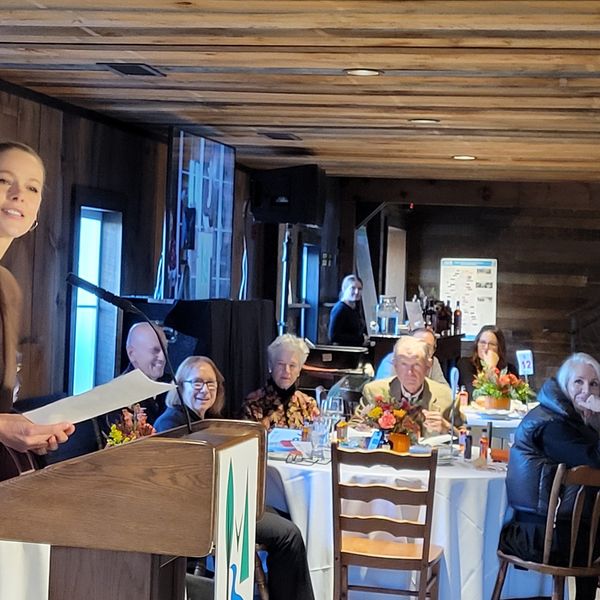Latest News
The Connecticut Interscholastic Athletic Conference football championship games were held Dec. 13 and 14, crowning new state champs in the six class divisions.
Teams are matched into classes based on school enrollment size from the previous academic year, as well as co-op status and past performance. The eight teams with the best record in each class qualify for postseason tournaments (48 qualifying teams in total).
In the title game for Class LL, Greenwich High School blanked West Haven High School 14-0. Greenwich won its second state title in the past three years and its 10th in school history.
In a repeat of last year’s Class L championship, New Canaan High School defeated Darien High School for the second year in a row. New Canaan’s 35-21 victory marked the school’s third straight Class L crown.
In the title game for Class MM, Masuk High School stunned top seeded Windsor High School 24-21. It was Masuk’s first state championship since 2010 and third in school history. Windsor was previously undefeated this year and had won the semifinal game 50-0.
In the Class M championship game, St. Joseph High School won a 21-20 nailbiter against Brookfield High School. St. Joseph was up 21-0 in the third quarter, but undefeated Brookfield responded with three consecutive touchdowns. Brookfield was unsuccessful on a two-point conversion attempt with one minute to play and the game ended. St. Joseph took home a state trophy for the 16th time in school history, most recently in 2019.
In the title game for Class SS, Killingly High School won 48-33 over Sheehan High School. Killingly has appeared in five championship games in the last seven years and has won three of them.
In the championship for Class S, Ansonia High School defeated reigning champions Bloomfield High School 58-12. The win marked Ansonia’s 22nd all-time state championship with 33 total title appearances, the most in state history.
Ansonia was the only Naugatuck Valley League team to advance beyond the quarterfinal round in any class this year. JFK High School (LL), Naugatuck (L), Torrington (MM) and Watertown (M) each lost in the first round.
Welcome!
Special Subscription Offer
We’re delighted to offer you the special 50% off discount rate to The Lakeville Journal.
Simply press the “Special Subscription Offer” button below and you will be directed to our Subscription Page.
On the Subscription Page, enter the word welcome in the Promocode box, then click the Apply Promo Code button.
Thank you for becoming a subscriber to The Lakeville Journal!
If you have any questions, please click here to contact us, email circulation@lakevillejournal.com, or call 860-435-9873 x301.
Local Matters
The Lakeville Journal has been publishing for generations, but we’ve recently made significant investments in news coverage, including:
Proposed Developments

Our coverage has closely followed various proposals, such as the Wake Robin Inn redevelopment plan, and what they may mean for our communities.
What To Do Newsletter

Our weekly newsletter from Natalia Zukerman with her best picks of upcoming local events. Delivered to you on Thursday mornings in time for you to learn "What To Do" this weekend.
Environmental Coverage

Stories ranging from new discoveries of forever chemicals in our water supply to aggressive response to hydrilla in our local lakes.
Offer expires January 30, 2025
Stephen S. Myers
LAKEVILLE — Stephen S. Myers, 82, of Lakeville, (formerly of New York City, Almond, New York, Kane’ohe, Hawaii, and Fair Oaks, California) passed away peacefully at his home on Nov. 30, 2024. He is survived by his wife Elizabeth “Betsy” (Phelan), his two sons Matthew and Shepherd, two nephews and three nieces.
Stephen was born in Elmhurst, Illinois, on Oct. 29, 1942, the son of the late Elwood Mosman and Donnie Marguerite Myers. Growing up in Glen Ellyn, Illinois, Stephen struggled with dyslexia in multiple high schools, ultimately graduating from Avon Old Farms High School in Avon, Connecticut.
Before attending Pratt Institute, he lived in a beach shack Shelter Island for a year and remembered this as a time when “you could walk the beach and eat the fish.” At Pratt he met his wife, Betsy, and helped to establish photography as a major there with the assistance of his friend Robert Mapplethorpe. As one of the first wave of artists to move to the Cast Iron District in Lower Manhattan, he and Betsy renovated a 3,200 square-foot loft and became one of many artists illegally living in the Soho loft spaces. They ran a photo studio for commercial clients, as well as doing street photography, including a role as the club photographer for the Alien Nomads’ MC or Motorcycle Club (which later became the New York City Hells Angels Chapter). He was a major contributor to New Journalism in New York City with Milton Glaser and Clay Felker during the 1960’s and 1970’s. His investigative photojournalism was featured in major stories about media figures along with current events in New York City and upstate New York. He documented multiple artists, musicians and notable persons (including Jim Morrison and The Doors, Sly and The Family Stone, Eddie Egan, Russell Means, Dennis Banks, John Lee Hooker, and Count Basie) from the Sixties to the present.
In the late 1970’s Stephen and Betsy relocated to Western New York where he continued his photography work full time, including becoming a field tester for Eastman Kodak’s pre-production professional films and papers, as well as photos in the ad campaigns to introduce the product to the marketplace. His North Coast Native American mask photography for the American Museum of Natural History was used extensively across dozens of publications. He was a runner-up for the 1998 Ellie National Magazine Award for his LIFE Magazine article about his plant photography in which he was featured.
In 1988 Stephen and his wife led a grassroots resistance campaign, with the help of physicist Theodore “Ted” Taylor and the local community, against the New York State government over a proposed low-level radioactive dump. Rallying everyone from hardscrabble farmers, the sheriff, political leaders, academics, media, and even the members of the local Mennonite community, they were able to increase their ranks and bring many disparate groups together. At one point Stephen read the Declaration of Independence to an audience of over 5,000 at a county-wide meeting. He considered this day, and the fact that the entire campaign remained a form of nonviolent protest, to be among his greatest accomplishments. This activism led to a U.S. Supreme Court challenge, New York v. United States, 505 U.S. 144 (1992), which is the first enduring challenge of states’ rights under the 10th Amendment of the U.S. Constitution. They were able not only to stop construction of the dump, but also to change how the federal government would handle the disposal and containment of such waste for future generations.
His work was published in LIFE Magazine, New York Magazine, Esquire, Playboy, Fortune, A.D. Magazine, New Times Magazine, Harper’s Magazine, Natural History Magazine, VIVA Magazine, Seventeen, Audience Magazine, Working Woman, National Lampoon, The Saturday Review, and NOVA. Prints of his work can be found in the permanent collections of the Victoria and Albert Museum, Fenimore Art Museum, Albright-Knox Art Gallery, George Eastman House, the Robert L. Pfannebecker Collection, the Almond Historical Society Archives, American Museum of Natural History, Robert Sobieszek Collection, Center for Creative Photography at the University of Arizona, George Eastman House, the Sidney Clark Collection at Avon Old Farms, Cooper Hewitt, Smithsonian Design Museum, Atlantic Richfield Company (ARCO) Collection, and Kroch Library’s Rare Manuscript Collections at Cornell University.
After raising his children in Western New York State, he and Betsy lived in various places before returning to the Northeast. Stephen had a lifelong passion and love for woodworking, painting (oil & watercolor), restoring antiques, attending estate sales and flea markets, listening to music, and riding his bicycle with his sons.
Ella L. Clark
WEST CORNWALL — Ella L. Clark, 83, a social worker, writer, and lover of nature and the Post Office, died Nov. 7, 2024 at Vassar Brothers Hospital in Poughkeepsie, after an acute stroke. Her family was with her in her last week.
Ella was predeceased by her parents, Benjamin S. and Charlotte L. Clark, her brother, Benjamin Clark, and her sister Tib Clark. Ella is survived by her daughter, Cristina Mathews of Fort Bragg, California, and her husband Jason and son Milo, her son Alexander Mathews, of Newton, Massachusetts, and his wife Olivia and children Ariana, Damian, and Torey, her daughter Jessica Meyer, of Pacific Palisades, California, and her husband Tim and children Ione and Nikos; and her sister Charlotte de Bresson of Paris.
Ella was born in New York City on Dec. 23, 1940. She was educated at Milton Academy and Radcliffe College. She married Richard Mathews in 1965; soon after, they traveled more than a thousand miles down the Yukon River. After building a house in Amenia, they moved, with their two children, Alexander and Cristina, then 2 and 3, onto a fishing boat, and fished commercially, first in southeast Alaska for salmon, and then up and down the West Coast for albacore.
In fall 1972, Ella moved on shore with the children, and her marriage ended. In Point Reyes Station, California, she found a close community of artists and carpenters and became involved in community projects. With Jonathon Meyer she had her third child, Jessica.
Ella moved back East in 1983, landing in Sharon. She was an EMT on the Sharon volunteer ambulance crew, and worked at Oblong Books in Millerton.
Ella’s real career began in 1988, when she began working for the town of Sharon as a social worker. For 31 years, she threw herself into the work, focusing especially on affordable housing, health services, and fuel assistance. Ella founded several organizations, including the Chore Service and the Sharon Community Foundation. She served on various boards and commissions, including the Sharon Hospital Board and the Cornwall Conservation Board. Ella was delighted to be named the Grange Citizen of the Year in 2007.
Ella was a prolific correspondent and writer. Ella enjoyed research, number crunching, and analysis to support grant applications and reports. She was a frequent Cornwall Chronicle contributor, often writing about the natural world, always choosing interesting, non-obvious topics. She loved digging into archives, getting the facts and voices right, and winnowing down what she had learned to the compact size the Chronicle demanded.
Ella moved to West Cornwall in 1991. Firmly rooted on Town Street, she “loved bird watching, taking photos of bears, smoking cigarettes after dinner, fighting for equity for all people, and putting orange peels on top of the fireplace,” as her granddaughter Ariana remembers.
A celebration of Ella’s life will be held at 1 p.m. on Saturday, April 19, 2025, at the Cornwall Village Meeting House, 8 Bolton Hill Road, Cornwall, Connecticut.









